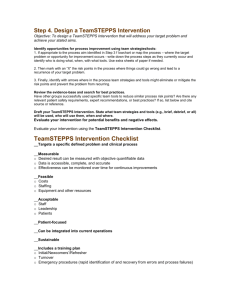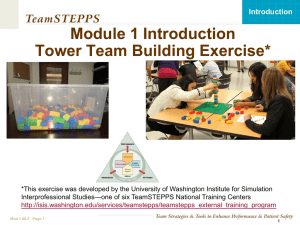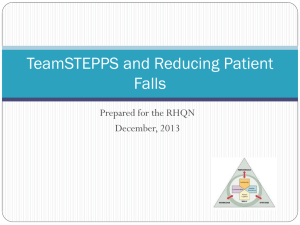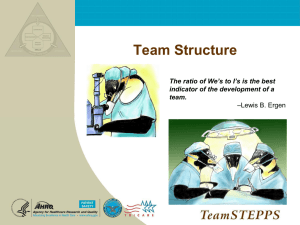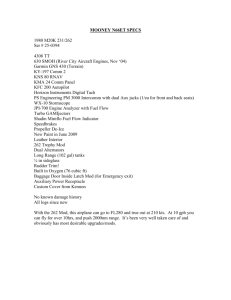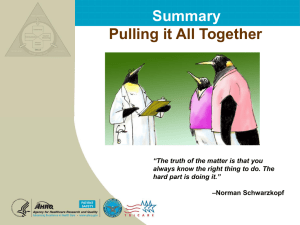Leadership - K-HEN
advertisement
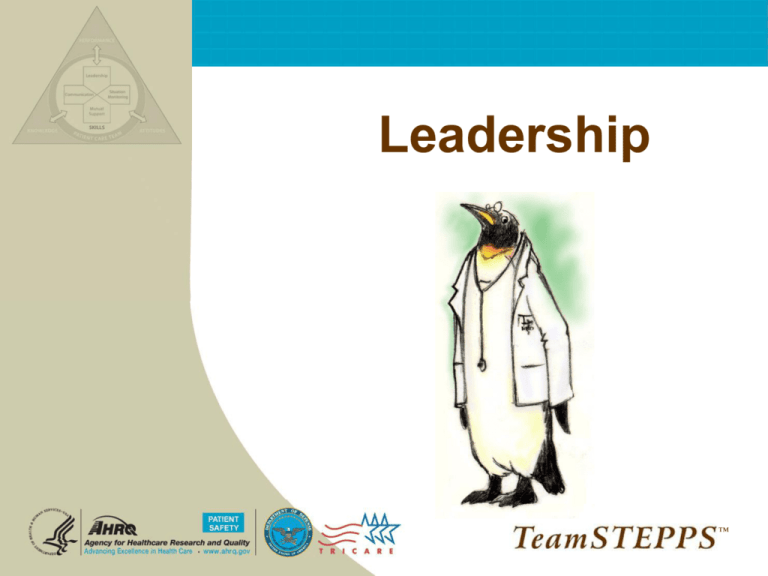
Leadership ™ Leadership ™ Objectives Describe different types of team leaders Describe roles and responsibilities of an effective team leader Describe the leader’s role in resource management Describe the delegation process Describe strategies for team leaders to include briefs, huddles, and debriefs Describe how effective team leaders facilitate conflict resolution Identify the barriers, tools, strategies, and outcomes of leadership Mod 3 06.1 Page 2 TEAMSTEPPS 05.2 2 Leadership ™ Mod 3 06.1 Page 3 TEAMSTEPPS 05.2 3 Leadership ™ Team Leader Two types of leaders: Mod 3 06.1 Page 4 Designated – The person assigned to lead and organize a designated core team, establish clear goals, and facilitate open communication and teamwork among team members Situational – Any team member who has the skills to manage the situation-at-hand TEAMSTEPPS 05.2 4 Leadership ™ Effective Team Leaders Organize the team Articulate clear goals Make decisions through collective input of members Empower members to speak up and challenge, when appropriate Actively promote and facilitate good teamwork Skillful at conflict resolution Mod 3 06.1 Page 5 TEAMSTEPPS 05.2 5 Leadership ™ Resource Management is… A strategy for achieving workload balance within and across teams in a unit Mod 3 06.1 Page 6 Refers to people, knowledge or information, materials and time that can be drawn upon to accomplish a task Goal is to prevent work overload situations that compromise situation awareness and increase the risk of error TEAMSTEPPS 05.2 6 Leadership ™ Resource Management Core Team Leader Coordinating Team Leader • Information • Information – Patient & Family – Plan of care – Facilities – Administrative – Facilities • Time • Equipment • Time • Equipment • Patient flow HUMAN CAPITAL FOCUS Team & Your Unit Mod 3 06.1 Page 7 • Other departments FOCUS Support Units TEAMSTEPPS 05.2 7 Leadership ™ Delegation Method of re-distributing tasks or assignments Process includes 4 steps: Decide what to delegate Decide to whom to delegate Communicate clear expectations Request feedback Mod 3 06.1 Page 8 TEAMSTEPPS 05.2 8 Leadership ™ Promoting & Modeling Teamwork Effective leaders cultivate desired team behaviors and skills through: Mod 3 06.1 Page 9 Open sharing of information Role modeling and effectively cueing team members to employ prescribed teamwork behaviors and skills Constructive and timely feedback Facilitation of briefs, huddles, debriefs, and conflict resolution TEAMSTEPPS 05.2 9 Leadership ™ Exercise: Leadership Discuss/think about, and make notes: Mod 3 06.1 Page 10 1. What characteristics, attitudes, or skills made the leaders you have known effective and successful? 2. If there was room for improvement, what could they have done to be more effective, in your opinion? 3. Does your group feel that leadership can be learned/taught or is it an innate skill? 4. What one characteristic is most important to the success of effective leaders? TEAMSTEPPS 05.2 10 Leadership ™ Team Events Briefs – planning Huddles – problem solving Debriefs – process improvement Leaders are responsible to assemble the team and facilitate team events But remember… Anyone can request a brief, huddle, or debrief Mod 3 06.1 Page 11 TEAMSTEPPS 05.2 11 Leadership ™ Briefs Planning Form the team Designate team roles and responsibilities Establish climate and goals Engage team in short and long-term planning Mod 3 06.1 Page 12 TEAMSTEPPS 05.2 12 Leadership ™ Mod 3 06.1 Page 13 TEAMSTEPPS 05.2 13 Leadership ™ Planning Essentials for Teams Leader usually initiates the planning process Team members are included in the planning process Team members have a common understanding of the problem and their roles Mod 3 06.1 Page 14 TEAMSTEPPS 05.2 14 Leadership ™ Briefing Checklist TOPIC Who is on core team? All members understand and agree upon goals? Roles and responsibilities understood? Plan of care? Staff availability? Workload? Available resources? Mod 3 06.1 Page 15 TEAMSTEPPS 05.2 15 Leadership ™ Huddle Problem solving Mod 3 06.1 Page 16 Hold ad hoc, “touch-base” meetings to regain situation awareness Discuss critical issues and emerging events Anticipate outcomes and likely contingencies Assign resources Express concerns TEAMSTEPPS 05.2 16 Leadership ™ Mod 3 06.1 Page 17 TEAMSTEPPS 05.2 17 Leadership ™ Debrief Process Improvement Brief, informal information exchange and feedback sessions Occur after an event or shift Designed to improve teamwork skills Designed to improve outcomes Mod 3 06.1 Page 18 An accurate reconstruction of key events Analysis of why the event occurred What should be done differently next time TEAMSTEPPS 05.2 18 Leadership ™ Debrief Checklist TOPIC Communication clear? Roles and responsibilities understood? Situation awareness maintained? Workload distribution? Did we ask for or offer assistance? Were errors made or avoided? What went well, what should change, what can improve? Mod 3 06.1 Page 19 TEAMSTEPPS 05.2 19 Leadership ™ Facilitating Conflict Resolution Effective leaders facilitate conflict resolution techniques through invoking: Two-Challenge rule DESC script Effective leaders also assist by: Mod 3 06.1 Page 20 Helping team members master conflict resolution techniques Serving as a mediator TEAMSTEPPS 05.2 20 Leadership ™ Leadership BARRIERS TOOLS and STRATEGIES Hierarchical Culture Lack of Resources Shared Mental Brief or Information Ineffective Huddle Mod 3 06.1 Page 21 Model Adaptability Team Orientation Communication Conflict OUTCOMES Debrief TEAMSTEPPS 05.2 Mutual Trust 21 Leadership ™ Teamwork Actions Empower team members to speak freely and ask questions Utilize resources efficiently to maximize team performance Balance workload within the team Delegate tasks or assignments, as appropriate Conduct briefs, huddles, and debriefs Utilize conflict resolution techniques (i.e., Two-Challenge rule and DESC script) Mod 3 06.1 Page 22 TEAMSTEPPS 05.2 22
